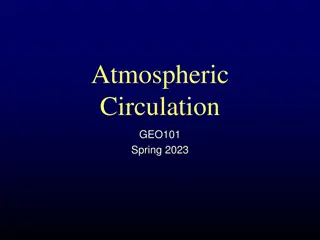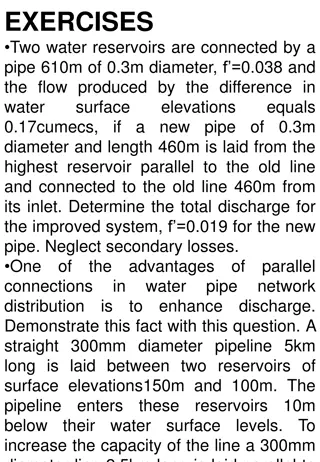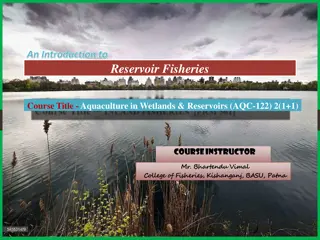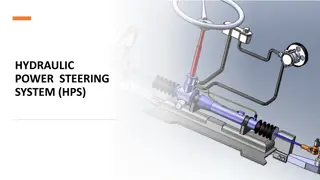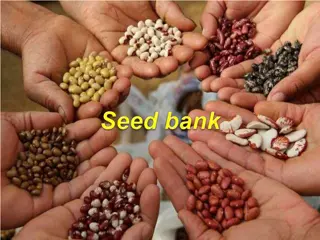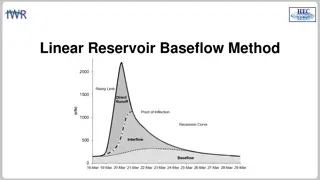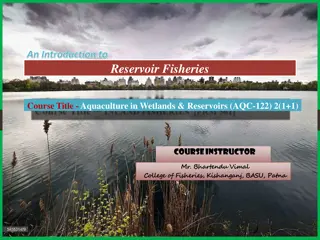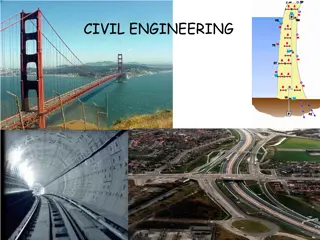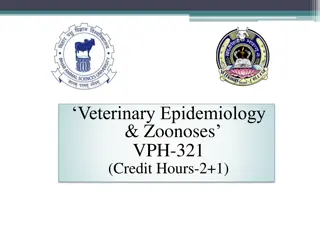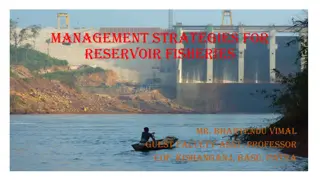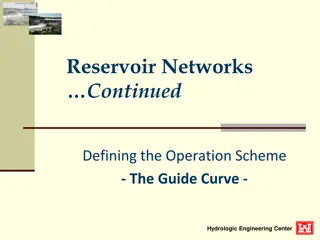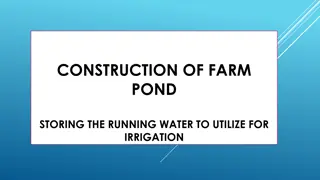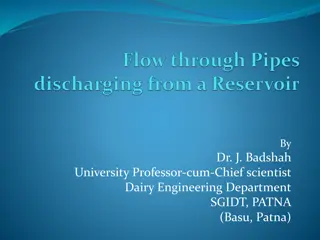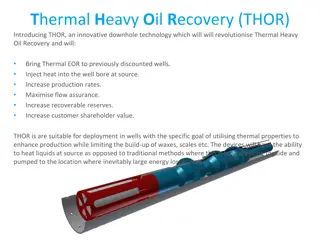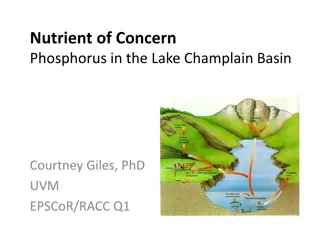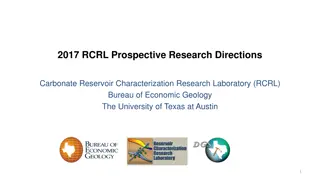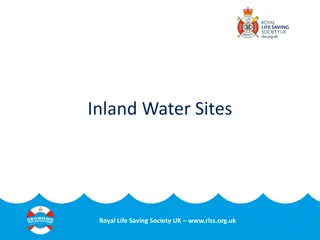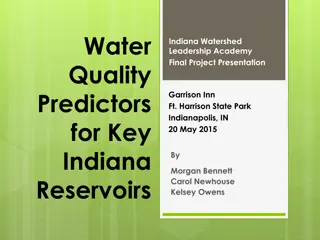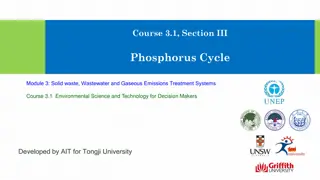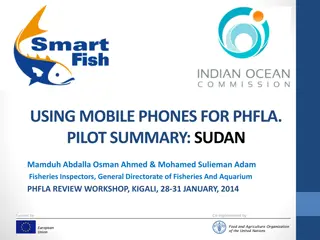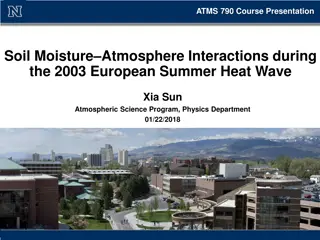National Conference on Agriculture (Kharif Campaign 2023) Highlights
The National Conference on Agriculture discussed Kharif prospects and strategies for 2023, including area and production of crops in 2022-23, rainfall data for Rabi and summer seasons, and region-wise live storage of water in major reservoirs. Insights on crop production, rainfall patterns, and wate
1 views • 18 slides
Water Management Strategies for Efficiency and Sustainability in Supply Systems
Customers with metered water supply are more water-efficient, promoting metering can increase awareness. Options include meter optants, metering on change of occupancy, supply pipe renewal, water efficiency, consumption data audits, and commercial water efficiency. Distribution management focuses on
1 views • 6 slides
Managing Multiple Purposes in Reservoir Operations
Reservoirs with multiple purposes can present challenges in balancing competing needs such as water supply, flood risk management, hydropower generation, and more. Understanding the interactions between these purposes is essential for optimizing reservoir operations and ensuring reliable water suppl
2 views • 24 slides
Understanding the Carbon Cycle: Reservoirs, Dynamics, and Importance
Earth's carbon cycle plays a crucial role in sustaining life, with carbon moving through various reservoirs and processes. This cycle involves short-term terrestrial and marine cycles, as well as long-term cycles influenced by volcanic activity and rock weathering. Understanding carbon reservoir dyn
6 views • 45 slides
Insights into Earth's Geochemical Cycles and Isotopic Evolution
Explore the primordial, depleted, and recycled components in basalts to understand deep Earth reservoirs, recycling paths, and core-mantle dynamics using isotope geochemistry. Learn about radioactive decay systems, mantle array evolution, and U-Th-Pb systematics in planetary differentiation.
6 views • 30 slides
Understanding Earth's Water Cycle and Atmospheric Processes
Explore the intricate workings of Earth's water cycle and atmospheric processes, including the distribution of water across various reservoirs, the significance of humidity in the atmosphere, and the influence of temperature on water vapor content. Gain insights into global wind patterns, pressure s
2 views • 42 slides
Water Pipeline System Design and Analysis Exercises
This exercise set explores various scenarios related to water pipeline systems, including connecting reservoirs, parallel and series connections, flow rate calculations, friction losses, power requirements for pumping, and more. The exercises cover topics like pipe diameter, length, friction factors
1 views • 5 slides
Overview of Reservoir Fisheries and Aquaculture in India
Reservoir fisheries play a vital role in India's aquaculture sector, with over 19,000 reservoirs covering millions of hectares. These manmade impoundments serve various purposes like irrigation and power generation. The reservoirs are classified into small, medium, and large categories based on thei
1 views • 28 slides
Understanding Infections through Skin and Mucous Membranes
Infections can be transmitted through skin and mucous membranes via direct or indirect human contact, as well as from non-human sources. The infective agents include viruses, bacteria, fungi, and arthropods. Factors like high population density, poor hygiene, and host behavior play crucial roles in
4 views • 26 slides
Evolution and Components of Hydraulic Power Steering Systems
Hydraulic Power Steering Systems (HPS) have a rich history dating back to the late 19th century, with key advancements leading to their widespread adoption in modern cars. This article explores the origins, development, and key components of hydraulic power steering systems, highlighting their impor
0 views • 15 slides
Understanding the Importance of Seed Banks in Ecosystems
Seed banks, categorized into soil and aerial types, serve as essential reservoirs for viable seeds and propagules. Soil seed banks are natural storage areas for seeds within ecosystems and play a crucial role in plant regeneration. They can persist for varying durations, influencing plant diversity
1 views • 16 slides
Understanding Linear Reservoir Baseflow Method
The linear reservoir baseflow method utilizes linear reservoirs to simulate the movement of water infiltrated into the soil. This method models water movement from the land surface to the stream network by integrating a linear relationship between storage and discharge. Users can select from one, tw
0 views • 11 slides
Understanding Reservoir Fisheries and Aquaculture in India
Reservoir fisheries play a crucial role in India, with over 19,000 reservoirs covering millions of hectares. These manmade impoundments serve various purposes such as irrigation and power generation. They are classified based on size into small, medium, and large reservoirs, each with distinct chara
0 views • 28 slides
Water Crisis in Jordan: Causes, Consequences, and Solutions
The water crisis in Jordan is primarily due to water shortage, with the Jordan River running nearly dry. This crisis has severe consequences, including rapidly decreasing water resources, leading to a water stress crisis. However, solutions such as reservoirs, rainwater harvesting, and water conserv
2 views • 7 slides
Understanding Civil Engineering: Dams, Reservoirs, and Geological Considerations
Civil engineering work encompasses various structures like dams, embankments, motorways, bridges, buildings, and more. Building dams and reservoirs involves considerations of geological factors, rock properties, and structural design. Different types of dams, such as gravity dams and arch dams, serv
0 views • 23 slides
Understanding Rabies: A Comprehensive Overview
Rabies is an acute fatal disease affecting humans and warm-blooded animals, characterized by abnormal behavior, nervous disturbances, excessive salivation, and respiratory paralysis. It claims around 55,000 human lives globally, with efforts in rabies control showing marginal success. The etiology o
0 views • 22 slides
Enhancing Fishery Management Strategies in Indian Reservoir Fisheries
The demand for fish in India is increasing rapidly, but natural fish production from reservoirs is limited. The average fish productivity in Indian reservoirs needs to be improved to meet population demands. Strategies for fishery enhancement focus on optimizing ecosystem utilization, modifying habi
0 views • 16 slides
An Overview of Reservoir Types and Purposes
Reservoirs play a crucial role in managing water resources for various purposes like irrigation, hydroelectric power generation, flood control, and more. This article explores different types of reservoirs such as storage, flood control, retarding, and detention reservoirs, along with their function
1 views • 49 slides
Understanding Reservoir Operation Schemes: Guide Curves and Rules
Delve into the intricacies of reservoir operations through concepts like guide curves, zones, rules, and operation sets. Discover the essential elements that govern the decision-making process for storing and releasing water from reservoirs, ensuring optimal management and resource utilization.
0 views • 15 slides
Constructing Farm Ponds for Water Harvesting and Irrigation in Rural Areas
Proper water harvesting is essential for agricultural sustainability in rural areas. Farm ponds serve as reservoirs to store runoff and running water from natural sources, aiding in irrigation and fish production. The construction of a farm pond in Gram Panchayat Dulmot has significantly benefitted
0 views • 5 slides
Understanding Fluid Mechanics in Dairy Engineering: Applications and Numericals
Explore the application of Bernoulli's theorem in pipe flow, friction losses, and discharge calculations in the context of dairy engineering. Learn about pipe discharging from reservoirs, connecting two reservoirs, and pipes in series through detailed explanations and numerical examples.
0 views • 8 slides
Latest Updates on MOSART Development and Validation
Updates on MOSART modules including heat, sediment, and lake features presented at the E3SM All-Hands meeting. Development progress, validation results, and ongoing/future work discussed for better water/heat balance coupling in deep water bodies like lakes and reservoirs. Detailed testing and valid
0 views • 9 slides
Revolutionary Downhole Technology for Thermal Heavy Oil Recovery (THOR)
THOR is an innovative downhole technology that aims to revolutionize Thermal Heavy Oil Recovery by bringing Thermal EOR to previously discounted wells, increasing production rates, maximizing flow assurance, and enhancing recoverable reserves. THOR's key benefits include flexible power options, safe
1 views • 6 slides
Geothermal Energy: Sources and Applications
Geothermal energy is harnessed from Earth's internal heat sources, such as radioactive decay and residual heat. Different geothermal energy sources include hot water reservoirs, natural steam reservoirs, and geopressured reservoirs. This renewable energy is utilized for space heating, air conditioni
0 views • 22 slides
Exploring Phosphorus: History, Distribution, and Impact in the Lake Champlain Basin
Explore the history and significance of phosphorus, a nutrient of concern in the Lake Champlain Basin. From its discovery by Hennig Brand in 1669 to its various uses in fertilizers, detergents, and even warfare, phosphorus plays a critical role in the environment. Discover the global phosphorus pool
0 views • 53 slides
RCRL Prospective Research Directions in Carbonate Reservoir Characterization
The RCRL group at the University of Texas at Austin specializes in research on carbonate reservoirs at various scales, from nanopores to basin architecture. They focus on developing predictive relationships and tools for reservoir characterization based on subsurface datasets and outcrop analogs. Th
1 views • 12 slides
Insights into the Plague: Epidemiology, Etiology, and Outbreaks
The Plague, caused by Yersinia pestis, has a chilling history spanning pandemics like the Justinian Plague and the Black Death. Understanding its etiology, family, and pathogenicity is crucial. This deadly disease has had notable outbreaks in India, emphasizing the importance of recognizing its host
0 views • 24 slides
Blue Ribbon Fisheries Technician - FY20 Project Details
Blue Ribbon Fisheries Technician project focuses on independently tackling sampling, facility, and administrative/data needs for high-profile waters in the NER, including High Uintas, BR reservoirs and streams, and Green River tailwater fisheries. Accomplishments in 2018 included various sampling ac
0 views • 5 slides
Staying Safe Around Inland Water Sites - Tips and Dangers
Over half of drownings occur at inland water sites like rivers, lakes, quarries, reservoirs, and canals. It's important to understand the risks associated with open water swimming and the precautions to take. Cold water can be particularly dangerous, affecting swimming abilities and posing immersion
0 views • 17 slides
Water Quality Predictors for Key Indiana Reservoirs - Indiana Watershed Leadership Academy Final Project Presentation
This project delves into the impact of climate change on water supplies, focusing on key Indiana reservoirs. Through data mapping and literature research, the aim is to identify water quality predictors for ensuring a reliable water supply for the well-being of society. By analyzing key reservoirs l
0 views • 46 slides
Understanding the Phosphorus Cycle in Environmental Science
Exploring the intricate processes of the phosphorus cycle, this module delves into how solid waste, wastewater, and gaseous emissions are treated within environmental science and technology frameworks. The discussion covers the distinctive aspects of the phosphorus cycle, its impact on land and wate
0 views • 13 slides
Comprehensive Overview of Rabies: Causes, Symptoms, and Impact
Rabies, also known as hydrophobia, lyssa, or lytta, is a severe viral disease affecting mammals, including humans, leading to damage to the nervous system and inevitable death. The disease is caused by a large RNA neurotropic virus of the genus lyssavirus. Rabies is transmitted through the infected
0 views • 22 slides
Fisheries Overview and Data Collection in Sudan
This report discusses the use of mobile phones for PHFLA pilot in Sudan, presented at the PHFLA review workshop in Kigali. It highlights the inland and marine fisheries resources in Sudan, including key findings, infrastructure, activities, stakeholders, post-harvest losses, interventions, and the w
0 views • 36 slides
Understanding Reservoirs of Germs in Healthcare Environments
Reservoirs of germs in healthcare settings can be found in various places such as water, wet surfaces, dry surfaces, and medical devices. Understanding where germs thrive is crucial for infection control strategies in healthcare facilities. This session delves into the importance of recognizing pote
0 views • 20 slides
Soil Moisture-Atmosphere Interactions in the 2003 European Summer Heat Wave
This presentation discusses the significant impacts of soil moisture-atmosphere interactions during the 2003 European Summer Heat Wave, highlighting the abnormally hot weather, pavement buckling, and high-pressure systems that contributed to the extreme conditions. The images and diagrams illustrate
0 views • 27 slides
Trends in Parasitic Copepod Infection Among Juvenile Salmonids in WVP Reservoirs Study
Study conducted by the Oregon Department of Fish and Wildlife researchers to investigate trends in parasitic copepod infection among juvenile salmonids in WVP reservoirs. The study focuses on the prevalence and intensity of infection on the gills, comparing infection levels between stream-rearing an
0 views • 12 slides
Finite Element Modelling of Three-Phase Non-Isothermal Flow in Heavy Oil Reservoirs - SAGD Case Study
Introduction to thermal enhanced oil recovery (TEOR) techniques with a focus on steam injection for heavy oil reservoirs. The study explores the impact of temperature on viscosity using API classification of crude oil. Mathematical models and equations for continuity and momentum in SAGD configurati
0 views • 15 slides
Understanding Refrigerators and Second Law of Thermodynamics
Refrigerators are devices that transfer energy between low and high-temperature reservoirs using work. This process involves various thermodynamic cycles like the heat pump cycle and air conditioner cycle. The efficiency of refrigerators is described by the coefficient of performance, which is cruci
0 views • 8 slides
Understanding Water Influx in Oil and Gas Reservoirs
Water influx, a critical aspect in oil and gas production, involves the expansion and flow of water from aquifers into reservoirs due to pressure drops caused by fluid production. This phenomenon impacts the degree of pressure maintenance, which can occur through various mechanisms like active water
0 views • 25 slides
Water Supply System in Cape Town: Overview and Infrastructure
Cape Town's water supply system, managed by the City of Cape Town's Water and Sanitation Department, serves over 4 million residents. The system relies on raw water from dams and reservoirs, with treatment plants ensuring water quality through processes like coagulation and disinfection. The distrib
0 views • 10 slides





